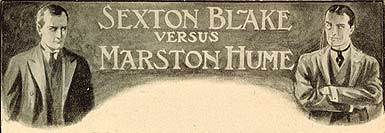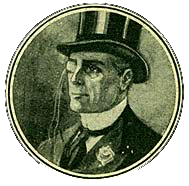SEXTON BLAKE VERSUS MARSTON HUME
by Cyril Rowe

It is from the pages of the PENNY PICTORIAL wherein some hundreds of Sexton Blake tales appeared (1908-1910) that this small saga is culled. A little gem from the pen of the rather obscure Michael Storm.
It comprises eight tales in sequence from Number 545 to 552 inclusive, with a brief mention in 553; followed around a year later with three tales in Nos. 604, 606 and 607 in the last of which Hume goes to his death.
In "Well Matched" Hume is introduced as an able criminal defence lawyer of some twenty-four years standing, but still comparatively young and well set up, well-dressed, scrupulously neat, masterful, strong-nosed, mobile mouth with thin lips. A keen man without a doubt, his eyes were steady, cold and introspective, a very cool customer indeed, a clubman of the select Baddely Club of which Blake is a member.
Suddenly for no ostensible reason, Hume gives up practicing. In the Club he is discussing the murder of an old woman — a locked door mystery — when Blake drops into the conversation and by inductive means, describes how the crime was committed and discloses that the murdered woman was Hume's Aunt and that he had prospered by £40,000. "£46,000" interjects Hume, coolly. Later, when Blake states that a certain type of knife with a serated end had been employed by the murderer, and pauses to light a cigar, Hume leans forward and offers a penknife to cut the end. "Pity to bite it and spoil a good end, use this," he said. A knife of exactly the type Blake had indicated. Yes, a cool customer indeed. Later, Blake sees him saunter away and says to himself "That man is a born fighter and a born criminal — a criminal genius — but one day his way will be mine".
The second tale, "The Bara Diamond" is one of a jewel robbery in Amsterdam, including a fake camera, false hotel bookings and travel discrepancy, which Blake again works out to be confronted with the competent Hume at work on a wax model and a completely repaired Gladstone bag (which otherwise would have been strong proof for Blake). Blake is frustrated but lets Hume know that he is aware of his misdeed. "Knowledge and proof," said Hume coldly, "are very different things".
Later it transpires that the diamond has been delivered to an Indian Maharajah in the wax model and the tale closes with Hume taunting Blake by sending him a copy of it "not because of its artistic merits, but in the hope that it may be of interest to you".
This cynical and sardonic manner Marston Hume conveys always; never more so than when he is hard pushed, and in the next tale when hard driven by Blake he only escapes by enthralling a theatrical acquaintance of his with a long discussion, and adroitly adjusting a clock in the course of it so that he has an alibi for the time when actually he had, as Blake well knows, murdered the sole witness against him, and picks up ten bob off Blake over a bet he made with him regarding this alibi.
The fourth tale "Quits" is really the first in which Blake shows to advantage, with deductive awareness throughout. He confronts Hume with his knowledge that the lawyer possesses stolen plans, at revolver point, and Hume drops the plans in the fire saying "You know I have the plans and of course I know I possessed them, and if you had retrieved them from me, then everyone would know. On the whole the fire is the best place."
Blake fires at and smashes Hume's camera. He is well aware that Hume's manoeuvre is only a ruse. The plans had been photographed. "I think we will call this quits, Mr. Hume. Good morning."
So the sequence goes on with Blake just a step behind in a murder case once again, where Hume has carefully destroyed the body by use of concentrated acid. The end line is: "You cannot prove murder without a body. Soames came here, but now there is no Soames and no law that can touch Marston Hume!"
In "The Louis Quinze Snuff Box" Blake is poisoned at Lady Molly Maxwell's by an infected needle point in the box and is able to expose Hume's villainy to his host but cannot prosecute. Gradually Blake is cutting away the ground from under Hume's feet.
 In "Abducted' the detective frustrates Hume, rescues the victim, but cannot quite bring home the charge. The final tale in the long first batch "Blake Scores" relates not how Blake proves criminal charges against him, but how he investigates Hume by studying his movements on the Stock Exchange where he has been buying shares against a bogus report and hopes to clean up. When the truth is revealed, Hume is kidnapped by Blake and kept a prisoner until the market has recovered, his chance has gone, and he is pauperized in the process. "You clearly understand," said Blake coldly, "I could have had you sent to prison. I prefer to leave you at liberty a beggared broken man. You will be less dangerous so." Hume goes and Blake's companion says "There was murder in that man's eyes." Blake looked at him and smiled. "Yes," he said quietly, "I noticed it myself."
In "Abducted' the detective frustrates Hume, rescues the victim, but cannot quite bring home the charge. The final tale in the long first batch "Blake Scores" relates not how Blake proves criminal charges against him, but how he investigates Hume by studying his movements on the Stock Exchange where he has been buying shares against a bogus report and hopes to clean up. When the truth is revealed, Hume is kidnapped by Blake and kept a prisoner until the market has recovered, his chance has gone, and he is pauperized in the process. "You clearly understand," said Blake coldly, "I could have had you sent to prison. I prefer to leave you at liberty a beggared broken man. You will be less dangerous so." Hume goes and Blake's companion says "There was murder in that man's eyes." Blake looked at him and smiled. "Yes," he said quietly, "I noticed it myself."
In numbers 604, 606 and 607 the adventures are completed with Hume's death. In "Trapped" Blake, held up on the steps of the Boddely Club, notices a figure in a taxi lighting a cigarette. In that blaze of light, he realised that "the one man in the world who had persistently defied and eluded him was within his reach at last." Altered, lined, aged and curiously unfamiliar, the face was beyond doubt that of the greatest criminal of the age, Marston Hume.
Blake trails him in a following taxi and confronts him in an apartment where Hume is sitting at supper. "One day," he said, "I knew you would make a mistake. Once before when in the hollow of my hand I let you go, but this time—" "Very theatrical" said Hume. "Please explain while I eat my disgracefully late meal." Blake then recounts many criminal acts — the murder of Emile Sheringham — the murder of old Lady Lyne — the theft of the Lahore Ruby — an attempt on his, Blake's, life — the purloining from Blake's rooms of evidence that he had accumulated against Hume — "More than enough to hang you Hume," he ends.
Hume denies it all in icy tones, saying "When did all this happen? — I've read no papers for a year, you accuse me of all the crimes in the calendar." Blake elaborates the crimes from a neat little note-book he opens, angered at the crook's poised assurance.
Hume cuts the ground from under Blake's feet by announcing that he has been blind for over a year, stone blind. "Quite melodramatic isn't it," he said and fumbles for a glass to take a drink. Blake's immediate tests for light reflection on the retina, and response, all fail and Hume rams home his condition with a Certificate from Sir Duncan Wyllie, which reports that Hume is suffering from a rare disease of the optic nerve, the only case he had ever known, but none the less genuine; absolute, total permanent blindness. Frustrated, Blake turns to go away, but Hume pulls a lever and Blake is dropped through a trap and into the river, is just creased by a revolver bullet, but happily rescued by the River Police just in time. They raid the room, but Hume has gone leaving a note which reads: Dear Mr. Blake, It gave me great pleasure to watch you from my window here taking your midnight dip. What a curious hour to select for a swim on a cold night like this. I would have saved you the trouble if I could, but my recent eye trouble seems to have affected me. I fear my aim was none too good. Pray accept my apologies — Marston Hume. Here I might interpolate, what tales, if any, have gone missing in the crimes Blake enumerated? Have any been lost or were they merely incidental to cover the lapse of a year?
The penultimate tale "The Great Bridge Mystery" shows Blake deducing from a tooth-marked briar pipe, a clean poker, where the rest of the fire irons are dusty, and past knowledge of Hume's earlier residences and therefore possible acquaintances, his responsibility for a murder and robbery, where the major crime had been assumed suicide, and trails Hume down to Newhaven Quay. The last tale has Hume arrested in his hotel and Blake, resolutely detailing the clues and evidence against him, including bloodstains in his car. Hume passes this contemptuously saying he had picked up an injured cyclist and if the cottage hospital was rung the accident patient would be found there. "I know you well enough, Marston Hume, to be able to reconstruct that part of the story," answered Blake grimly. "In order to account for those stains you would think nothing of running down a cyclist on a lonely road, even killing him if necessary, to support your tale, but I have found half a collar stud in your car stained with blood. The other half is on the railway victim and proves the case." Hume falls in a fit and against his better judgment Blake is forced to accept the fact, produce a doctor to attend him, and leaves him in his care. Of course it is a trick and Hume escapes but Blake chases him and, after a cliff top fight, Blake is just saved, but Hume is drowned and the contest of years is over.
So ends one of the most dramatic and characterful episodes of Blake's career. No more to be said, but I just wonder was the way left open for Hume's re-appearance?
Concurrent with these tales were the Rupert Forbes, Marsden Plummer series in the Union Jack and maybe Storm was overextended, but Hume was certainly one of his most remarkable creations and a pleasure to read.
